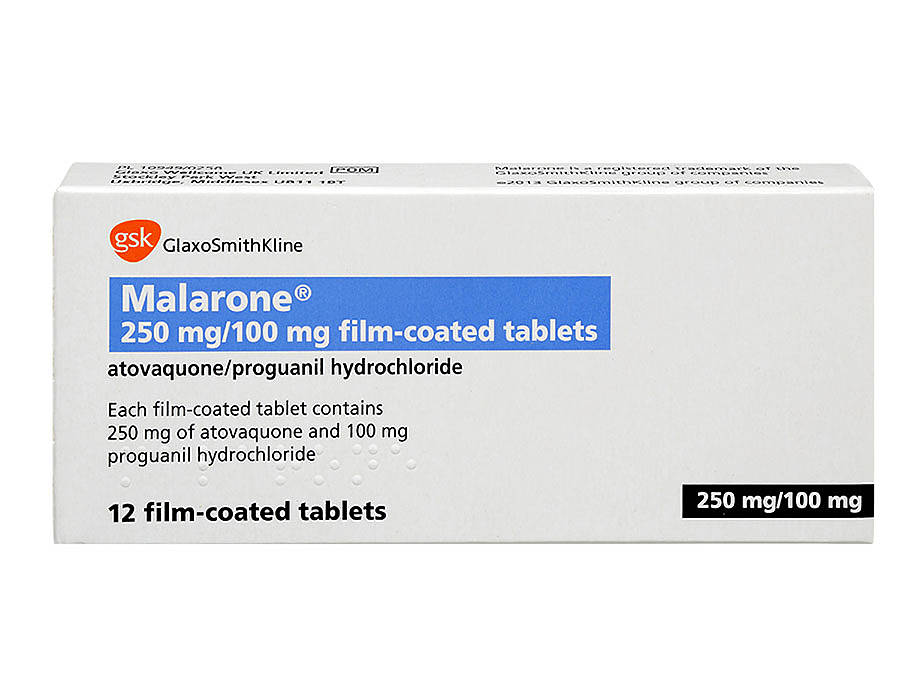Malarone
Order Consultation for Malaria Prevention Treatment


Malarone is a malaria prophylactic treatment for last minute travellers. You can start taking Malarone tablets just 1-2 days before your trip.
To place an order for a prescription for malaria prevention treatment, fill in our brief questionnaire. You can choose a preferred treatment, such as Malarone or Doxycycline. One of our doctors will check if the medication is suitable for you and issue your prescription to a local pharmacy in Ireland or your home address. Alternatively, you can also choose to have your medication delivered directly to your door. A consultation for malaria prevention treatment prescription costs €21.50.



About Malarone
-
-
Malarone contains the active ingredients atovaquone and proguanil, which prevent the spread of the malaria parasite. Atovaquone and proguanil work in similar ways to target the parasite’s reproductive process, by blocking specific enzymes the parasite needs to multiply. Malarone tablets specifically provide an effective protection from the Plasmodium falciparum malarial parasite.
Malarone tablets are more expensive than other malaria tablets, but the key benefit of Malarone is that it is less likely to cause side effects, compared to other treatments like Lariam and Doxycycline.
-
-
Malarone tends to be highly effective against Plasmodium falciparum (very common and causes the most severe malaria infection), but is much less effective in the prevention of other malaria parasite types. Depending on which malaria prevalent area you are travelling to, your doctor will advise you on the suitability of Malarone tablets and other antimalarials. Before requesting your malaria prevention treatment, you can check a current malaria map.
-
-
Malarone is normally chosen when travelling to a country with a particularly severe type of malaria parasite (Plasmodium falciparum). It is not suitable for everyone; pregnant and breastfeeding women must use an alternative treatment. It is important to inform your doctor of your medical history and other medicines you take, to ensure you are prescribed the most suitable antimalarial possible.
-
-
For effective malaria prevention, you should follow your doctor's advice carefully, taking your daily Malarone tablet regularly and for as long as necessary.
Malarone has no known interactions with any food and drink, allowing you to stick to your preferred diet. Also, Malarone does not decrease the effectiveness of the contraceptive pill. Malarone should not affect your ability to drive or operate machinery. However, if you feel at all drowsy, do not carry out these activities.
-
-
Yes. Sometimes patients believe they can stop treatment immediately upon arriving home, provided they are well. This is not the case – you must continue taking your Malarone tablets for at least 7 days after leaving the malaria prevalent area you travelled to.
If you do not complete your treatment course, you may develop severe symptoms of malaria if you were exposed to the parasite during your time abroad.
-
-
Malarone is taken daily, which some patients prefer to weekly tablets. While Lariam and Doxycycline need to be taken for up to a month after returning from a risk area, treatment with Malarone only needs to be continued for a week.
Malarone is also effective in treating malaria parasites which are resistant to other antimalarial treatments.
-
-
Malarone tablets are round, bi-convex and pink, engraved with ‘GX CM3’ on one side.
-
-
You should take 1 tablet daily, preferably with milk or food. Your course should start 2 days before you travel to the malaria prevalent area. The treatment should continue for the duration of your stay in the area, and then for a further 7 days.
If you miss a dose, do not panic. Take it as soon as you remember or, if it is near your next dose, skip the forgotten dose and continue treatment as normal. If you vomit or have diarrhoea within 1 hour of taking Malarone, take a repeat dose. In the case of an overdose, seek immediate medical assistance.
Paediatric Malarone tablets are available for children weighing 11-40 kg. The same instructions apply, but the dosage is different depending on their weight.
-
-
Each Malarone tablet contains atovaquone 250 mg and proguanil hydrochloride 100 mg. Malarone tablets also contain Poloxamer 188 BP., microcrystalline cellulose Ph.Eur., low-substituted hydroxypropyl cellulose USNF., povidone K30 Ph.Eur., sodium starch glycollate BP., magnesium stearate Ph.Eur., methyl hydroxypropyl cellulose Ph.Eur., titanium dioxide Ph.Eur., iron oxide red E172, macrogol 400 Ph.Eur. and polyethylene glycol 8000 USNF.
-
-
Possible side effects of taking Malarone include:
- feeling sick
- stomach pain
- diarrhoea
- loss of appetite
- headache
- difficulty sleeping
- coughing
- fever
- hair loss
- tiredness and weakness
- anaemia (low red blood cell count)
- disturbance of salt balance in the body
- temporary increase in some enzymes produced by the liver and pancreas
If you experience any of these side effects, or any others, speak to your doctor. In case of an allergic reaction (rash, shortness of breath, itchy skin, swollen face, eyelids and mouth), seek medical assistance immediately.
If you suffer any flu-like symptoms for up to a year after your return, you should see your doctor right away.
-
-
- are pregnant
- are breastfeeding
- are under 40 kg (take the paediatric form of Malarone)
- are allergic to any of the ingredients in Malarone
- have severe liver and kidney problems
- are travelling to an infected area for more than 4 weeks
- are taking Maxolon, tetracycline, rifampicin or rifabutin (these may affect your ability to absorb Malarone)
- are taking indinavir
You should not take Malarone for a period of over 6 months.
For a full list of side effects and cautions of taking Malarone, read the patient information leaflet that comes with your medicine.

Babak studied medicine at King’s College London and graduated in 2003, having also gained a bachelor’s degree in Physiology during his time there. He completed his general practice (GP) training in East London, where he worked for a number of years as a partner at a large inner-city GP practice. He completed the Royal College of GPs membership exam in 2007.
Meet our doctorsLast reviewed: 06 Jun 2023
